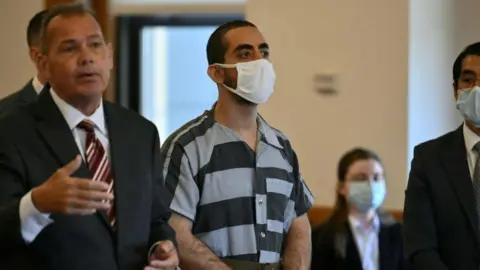BBC News in Mayville, New York
The trial of a man who allegedly stabbed renowned British-Indian author Salman Rushdie multiple times in 2022, leaving him blind in one eye, begins on Monday in upstate New York.
Hadi Matar, a 27-year-old man from New Jersey, is facing charges of attempted murder and assault. He has pleaded not guilty.
The attack, which was captured on video, took place at the historic Chautauqua Institute in northwestern New York, where Mr Rushdie was due to give a lecture.
The trial, in nearby Mayville, will be decided by a jury, who will hear from several witnesses including Mr Rushdie himself.

 Getty Images
Getty ImagesWhat happened to Salman Rushdie?
Mr Rushdie, 77, was due to give a lecture at the Chautauqua Institute in August 2022, where he was going to discuss how the US is a safe haven for exiled writers.
It was at that lecture that a man, whom prosecutors allege is Mr Matar, ran onto the stage and attacked Mr Rushdie and an interviewer.
Mr Rushdie was stabbed at least once in the neck and in the abdomen, authorities said. He has sustained liver damage, too.
The interviewer who was with Mr Rushdie, Henry Reese, suffered a minor head injury and was taken to a local hospital. Mr Rushdie, meanwhile, was airlifted to a hospital in Erie, Pennsylvania, where he underwent surgery and was put on a ventilator.
The incident was witnessed by many of the lecture’s attendees. A video posted online shows the moment people dashed onto the stage immediately after the attack, and police said a doctor in the audience gave Mr Rushdie first aid.
Police arrested Mr Matar, who was 24 at the time of the incident, shortly afterwards.
Why was Mr Rushdie subject to death threats?
For many years, Mr Rushdie had been the target of threats to his life after he published his novel The Satanic Verses in 1988.
The surrealist, post-modern novel was inspired by the life of the Muslim Prophet Muhammad. It had sparked outrage among some Muslims, who considered its content to be blasphemous, and was banned in some countries.
The threats forced Mr Rushdie into hiding for nine years, and he had often travelled with a security detail in fear for his life.
But in recent years, the 77-year-old author said he believed the threats against him had diminished. Two weeks before the attack, he told a German magazine that he felt his life was “relatively normal”.
Who is Hadi Matar?
Mr Matar, the suspect in the case, is from Fairview, New Jersey. He was born in the US to parents who had emigrated from Lebanon.
At the time of his arrest, police said they did not have a motive for the alleged attack.
The suspect later gave an interview from jail to the New York Post, where he praised Ayatollah Khomeini, Iran’s supreme leader, who had issued a fatwa – or a decree – calling for Mr Rushdie’s execution after the release of The Satanic Verses.
He has not said whether his alleged actions were influenced by the fatwa.
Mr Matar told the publication that he had only read a few pages of the novel. He added that he was inspired to go to Chautauqua after seeing a tweet announcing that Mr Rushdie would be visiting.
“I don’t think he’s a very good person,” Mr Matar reportedly said. “He’s someone who attacked Islam.”
Separate to the Chautauqua County Court charges, Mr Matar was charged by a federal court with providing material support to the Lebanon-based militant group Hezbollah, according to an indictment unsealed last July.
Hezbollah is designated a terrorist organisation by Western states, Israel, Gulf Arab countries and the Arab League.
Mr Matar has pleaded not guilty in the Chautauqua County case. At one point, his legal team unsuccessfully tried to move the trial to another county, arguing he risked an unfair trial due to the area’s lack of an Arab-American community and the publicity around the high-profile case.
He remains in custody at the Chautauqua County Jail. If found guilty of both attempted murder and assault, he faces a maximum of 32 years behind bars.
What was Ayatollah Khomeini’s fatwa against Salman Rushdie?
In the Islamic world, many Muslims reacted with fury to the book’s publication and death threats were made against Mr Rushdie.
He was forced to go into hiding, and the British government placed him under police protection. Iran quickly broke off relations with the UK in protest.
A year after the release of The Satanic Verses, Ayatollah Khomeini called for Mr Rushdie’s execution. He offered a $3m (£2.4m) reward in a fatwa, which is a legal decree issued by an Islamic religious leader.
Dozens of people died in protests over the novel, while others – including the book’s Japanese translator – were killed after the fatwa.
The bounty over Mr Rushdie’s head remains active, and although Iran’s government has distanced itself from Khomeini’s decree, a quasi-official Iranian religious foundation added a further $500,000 to the reward in 2012.
After the attack, Iran “categorically” denied any link with the alleged perpetrator. Some Iranian media praised the attack, and described Mr Rushdie as an apostate – someone who has abandoned or denied his faith – in their coverage.
How is Salman Rushdie doing now?
Mr Rushdie spent six weeks in hospital after the attack. He survived, but the injuries resulted in damage to his liver, lost vision in one eye and a paralysed hand caused by nerve damage to his arm.
He has since released a memoir about the attack called Knife.
The author is due to testify in the trial. He previously told BBC Newshour he was unsure if he wanted to face his alleged attacker in court.
“There’s one bit of me that actually wants to go and stand on the court and look at him and there’s another bit of me that just can’t be bothered,” he said.
In his memoir, Mr Rushdie contemplated what he would say to his alleged attacker.
“I find I have very little to say to you,” he wrote. “Our lives touched each other for an instant and then separated. Mine has improved since that day, while yours has deteriorated. You made a bad gamble and lost.”
Article by:Source:













